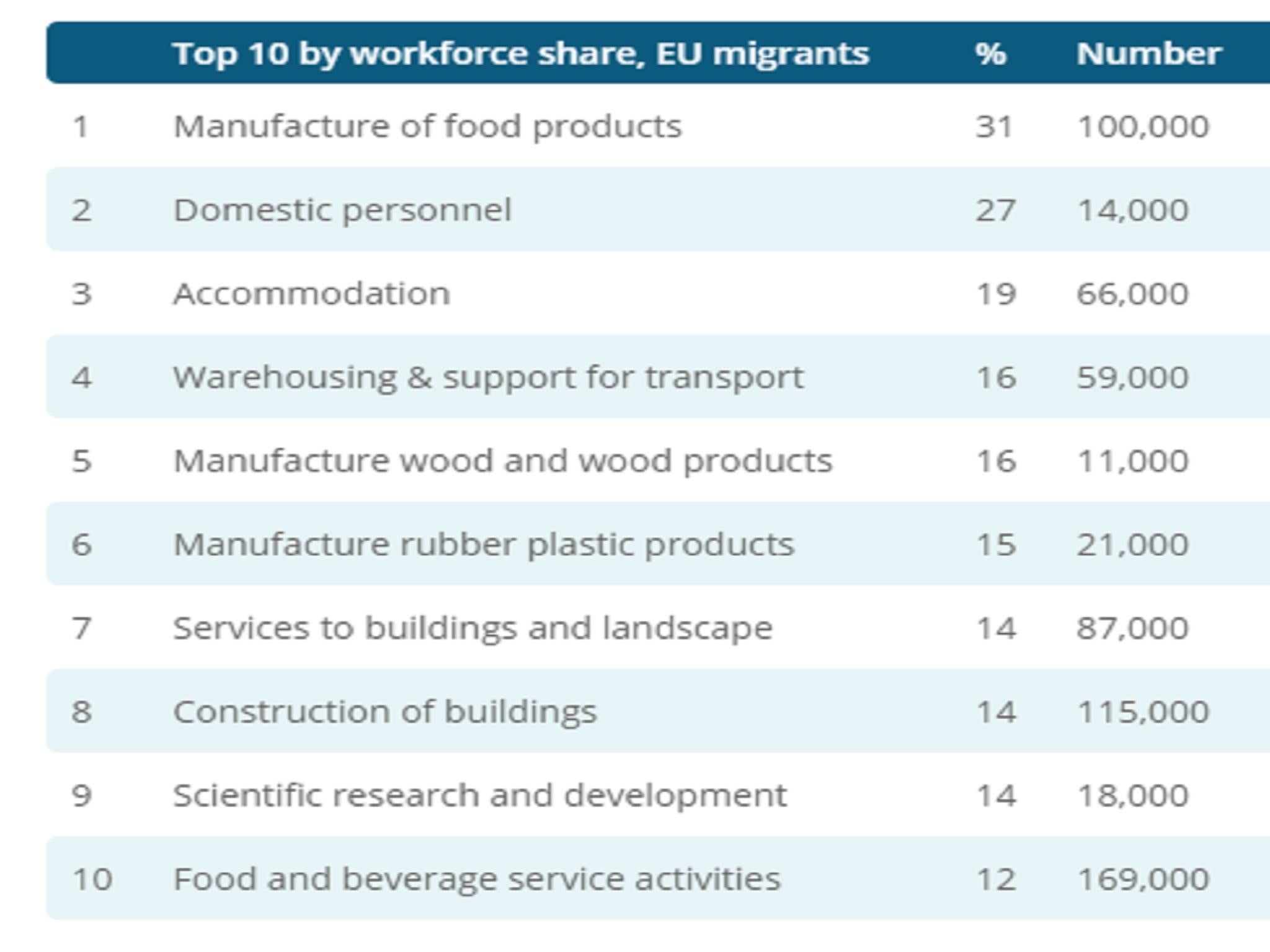Does low-skilled immigration really hurt the UK economy?

Your support helps us to tell the story
From reproductive rights to climate change to Big Tech, The Independent is on the ground when the story is developing. Whether it's investigating the financials of Elon Musk's pro-Trump PAC or producing our latest documentary, 'The A Word', which shines a light on the American women fighting for reproductive rights, we know how important it is to parse out the facts from the messaging.
At such a critical moment in US history, we need reporters on the ground. Your donation allows us to keep sending journalists to speak to both sides of the story.
The Independent is trusted by Americans across the entire political spectrum. And unlike many other quality news outlets, we choose not to lock Americans out of our reporting and analysis with paywalls. We believe quality journalism should be available to everyone, paid for by those who can afford it.
Your support makes all the difference.The UK government has announced plans to bring down “low-skilled” migration to the UK post-Brexit.
“It is going to bring [European Union] free movement to an end once and for all,” the Prime Minister Theresa May informed the BBC on Tuesday.
“We will be deciding who comes here. That decision will be based not on where somebody comes from but on the contribution they will make to our economy. And so it will be a skills-based system.”
This was in line with the recommendation of the Government’s independent Migration Advisory Committee (MAC) last month.
But businesses groups have sounded the alarm about the plan.
So what does the evidence suggest about the economic impact of low-skilled migration? What will the likely impact of cutting it off be? And could there be exemptions for certain business sectors?
What did the MAC propose?
It said that after Brexit the government should be looking to essentially end low-skilled immigration to the UK, but to make it easier than it is currently for high-skilled migrants to work here.
What is the definition of “skilled” here?
There’s an official grading scheme called the Regulated Qualifications Framework (RQF).
To be eligible for one of the UK’s “skilled” Tier 2 general visas foreigners need at least an RQF level 6 grade. This means the equivalent of an undergraduate degree or a graduate diploma or a degree apprenticeship.
However, the MAC suggests that the definition of “skilled” should be lowered to RQF level 3. This means the equivalent of A-levels.
The MAC says this would cover about 5 million UK workers, or about a third of the full-time employee workforce.
Yet the current visa system restricts Tier 2 visas to people who will command an annual salary of at least £30,000. And the MAC said this salary minimum should remain.
This is well above the UK’s median full-time wage of about £28,000.
“This wouldn’t just hit fruit-pickers and baristas but butchers, primary school teachers, radiographers and so on,” says Jonathan Portes of King’s College London.
Doesn’t low-skill immigration discourage employer training and depress wages?
This argument is frequently made. But studies presented by the MAC suggest otherwise.
“The research we commissioned showed that overall there is no evidence that migration has had a negative impact on the training of the UK-born workforce,” it said.
“Moreover, there is some evidence to suggest that skilled migrants have a positive impact on the quantity of training available to the UK-born workforce.”
As for wages, while the MAC found some evidence of a negative impact on the level of low-skill UK wages, the effect was judged to be “generally small”.
So why did the MAC advise restricting low-skilled migration?
It found that skilled migrants make a higher economic contribution.
“Higher-skilled workers tend to have higher earnings so make a more positive contribution to the public finances. The estimated labour market impacts, though small, also suggest that higher-skilled workers are of greater benefit as do any impacts on productivity and innovation,” it said.
Yet, despite its recommendations, the MAC didn’t find that low-skilled immigrations were an economic drain either in terms of national productivity or the public finances.
And a number of immigration experts and analysts, including the National Institute of Economic and Social Research (Niesr) and the IPPR think tank, disagree with the MAC’s policy recommendations.
“It’s true that in an ideal world we might want migrants to be highly skilled and high net-contributors, but that isn’t what all employers need,” says Heather Rolfe of Niesr.
“Post-Brexit immigration policy cannot ignore the needs of employers in key, low-skilled sectors and workable options need to be put in place.”
Official figures emphasise those needs.
More than 30 per cent of all employees in the food production sector are EU nationals. In domestic personnel the figure is 27 per cent and 16 per cent in warehousing.

What does business say?
Stephen Martin, director general of the Institute of Directors, said: “The division between and high and low-skilled misses an important point. Sectors like agriculture, retail, hospitality and construction rely heavily on so-called ‘low-skilled’ workers, in part because domestic workers want to work in other sectors, and in part because unemployment is at a record low.
“The UK needs a balanced migration policy which takes account of skills at all levels, a single-minded focus on reducing numbers would be cutting off our nose to spite our face.”
Carolyn Fairbairn, director-general of the Confederation of British Industry, said the prime minister’s proposals for a new system “have taken a wrong turn”.
“By dismissing the importance of low-skilled workers to the UK economy, the government risks harming businesses and living standards now and in the future,” she added.
“All skill levels matter to the UK economy. Today’s proposals risk worsening labour shortages, already serious in construction, hospitality and care. Restricting access to the workers the UK needs is self-defeating.”
Indeed, as early as January this year, the Federation of Master Builders reported that the shortage of construction workers for small- and medium-sized firms had hit the worst level on record. Subsequent research from the Construction Industry Training Board in July revealed about half of construction firms expect recruitment to become more difficult over the next two years.
Meanwhile, the British Chambers of Commerce said that, in the second quarter of this year, 71 per cent of manufacturing firms were reporting recruitment issues, with Brexit the “key factor”.
So could there be exemptions?
Ministers have already said they will seek to set up a scheme for unskilled seasonal agricultural workers to continue to come, a sector that is estimated to be made up of non-UK nationals.
There is also talk of a “specific route” for migrants to work in social care and hospitality.
Moreover, Theresa May in her BBC interview suggested there could be “movement of business people” and “mobility” as part of a future trade deal with the EU and also other countries, leaving the door open for the policy to be less restrictive than presented today.
And if labour shortages do start to have a clear negative impact on firms and the economy the political pressure for such a loosening will grow.
Join our commenting forum
Join thought-provoking conversations, follow other Independent readers and see their replies
Comments